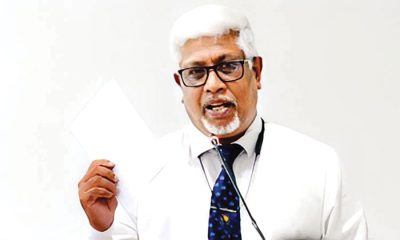Foreign News
Maldives president visits India amid trouble in tourist paradise
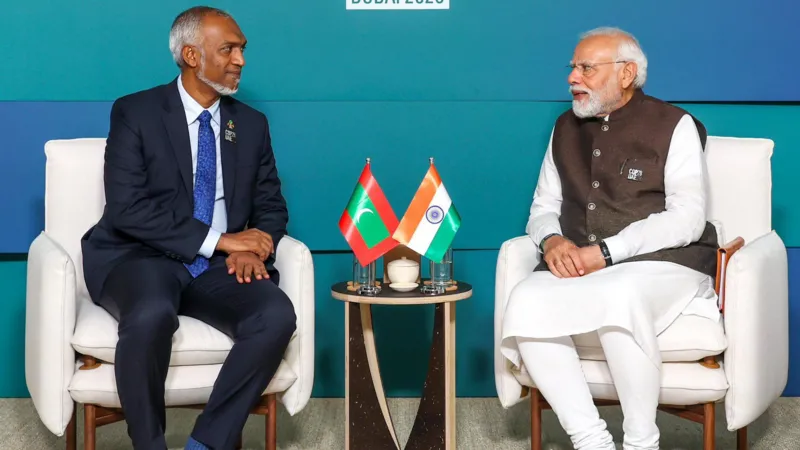
Maldivian President Mohamed Muizzu is expected to seek a bailout during his visit to India this week as the archipelago nation stares at an economic crisis with fears of debt default.
It’s Muizzu’s first official bilateral visit after he was voted to power late last year following a campaign centred on an ‘India out’ policy, with a promise to reduce Delhi’s influence.
Since then, ties have been strained between the countries but experts say the visit indicates that the Maldives can’t afford to ignore its giant neighbour.
The foreign exchange reserves of the Maldives stood at about $440m (£334m) in September, just enough for one-and-a-half months of imports.
Last month, global agency Moody’s downgraded the Maldives’ credit rating, saying that “default risks have risen materially”.
An Indian bailout will bolster the country’s foreign currency reserves.
Before visiting India, Muizzu chose to travel to Turkey and China – his visit to the latter in January was seen as a high-profile diplomatic snub to Delhi as previous Maldivian leaders first visited Delhi after being elected. Around the same time, a controversy erupted in India after three Maldivian officials made derogatory comments about Prime Minister Narendra Modi.
“President Muizzu’s visit is a turnaround in several ways,” says Azim Zahir, a Maldives analyst and lecturer at the University of Western Australia.
“Most notably, the visit is a realisation of how dependent the Maldives is on India, a dependency that no other country will find easy to fill,” he says.
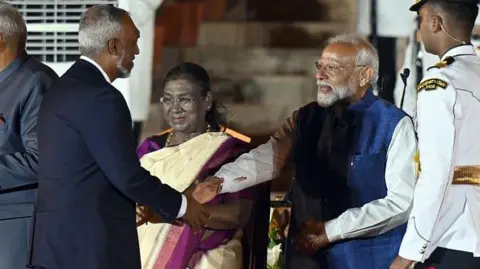
The Maldives consists of about 1,200 coral islands and atolls located in the middle of the Indian Ocean. The archipelago has a population of about 520,000 compared to India’s 1.4 billion.
As a small island nation, the Maldives depends on its giant neighbour India for most of its food, infrastructure building and healthcare.
Delhi and Male have not officially confirmed that a financial package for the Maldives is on the agenda during the visit. But experts believe it will be part of the discussion.
“The key priority of Muizzu’s visit is to secure a financial helpline in the form of grant-in-aid and restructuring debt repayments,” a senior Maldivian editor, who did not want to be identified, told the BBC.
Muizzu also wants a “$400m currency swap deal sought by the Maldives central bank to shore up depleted foreign exchange reserves”, he added.
The ratings agency Moody’s further expressed serious concerns over Male’s financial situation, saying that “(foreign) reserves remain significantly below the government’s external debt service of around $600m in 2025 and over $1bn in 2026”.
The public debt of the Maldives is about $8bn, including about $1.4bn it owes each to China and India.
“Despite Muizzu stating on several occasions that China has given a green signal for deferring debt payments for five years, financial assistance from Beijing has not been forthcoming,” the Maldivian editor said.
With no other country coming to the rescue, it appears that Muizzu is now reaching out to India to mend strained ties.
“It’s about resetting the tone and negative rhetoric from senior officials of Muizzu’s government that has considerably impacted Indian tourist arrivals,” says Zahir.
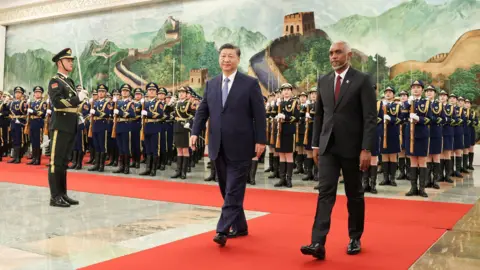
India has long wielded influence over the Maldives, whose strategic position in its backyard allowed it to monitor a crucial part of the Indian Ocean. But Muizzu wanted to change that by moving closer to China.
In January, Muizzu’s administration gave an ultimatum to India to withdraw about 80 troops based in the country. Delhi said they were stationed there to man and operate two rescue and reconnaissance helicopters and a Dornier aircraft it had donated years ago.
In the end, both countries agreed to replace troops with Indian civilian technical staff to operate the aircraft.
A month after assuming charge, Muizzu’s administration also announced that it would not renew a hydrographic survey agreement with India that was signed by the previous government to map the seabed in the Maldivian territorial waters.
Then a row broke out after three of his deputy ministers made controversial comments about Modi, calling him a “clown”, “terrorist” and a “puppet of Israel”.
The remarks set off an uproar and calls to boycott the Maldives on Indian social media. Male said the comments were personal and did not represent the views of the government. The three ministers were suspended from the cabinet.
In what was seen as a thinly-veiled criticism of the reaction on Indian social media, Muizzu said at the time: “We may be small, but that doesn’t give you the licence to bully us.”
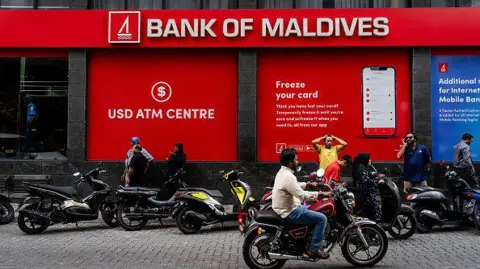
Muizzu’s administration also allowed the port call of a Chinese research ship, Xiang Yang Hong 3, much to Delhi’s displeasure. Some saw it as a mission to collect data which could – at a later date – be used by the Chinese military in submarine operations.
Nevertheless, there was a thaw in bilateral ties after Muizzu attended the swearing-in ceremony of Modi after he was elected for a third consecutive term in June this year.
In August, Indian Foreign Minister S Jaishankar’s visit also gave a reboot to bilateral ties. “The Maldives is one of the cornerstones of our ‘Neighbourhood First’ policy,” Jaishankar said in Male. “To put it succinctly in the words of my Prime Minister Narendra Modi – for India, neighbourhood is a priority and, in the neighbourhood, Maldives is a priority,” he added.
For Delhi, it’s a welcome change as it recently witnessed the ouster of the India-friendly government of former prime minister Sheikh Hasina in Bangladesh and the return of KP Sharma Oli, who used to criticise India’s policies, as the prime minister of Nepal.
Muizzu has realised that antagonising India is not an option and his pragmatism is not without reason. The number of Indian tourists visiting the Maldives dropped by 50,000 in the past year, resulting in an estimated loss of about $150m.
He is aware if he doesn’t get financial support from India, the Maldives could become a paradise lost. That’s why his India visit is crucial.
[BBC]
Foreign News
Nationwide strike for better pay brings Greece to standstill

A nationwide general strike disrupted public services across Greece, with ferries tied up in port, flights grounded and public transport running only part-time as labour unions press for higher wages to cope with rising living costs.
The 24-hour strike on Wednesday was called by the two main umbrella unions covering the public and private sectors, seeking a full return of collective bargaining rights which were scrapped as part of international bailouts during Greece’s financial crisis.
Greece has emerged from a 2009-18 debt crisis, which saw rolling cuts in wages and pensions in turn for bailouts worth about 290 billion euros ($319bn) and economic growth seen at 2.3 percent this year, outpacing other eurozone economies.
Tapping on the country’s progress, the conservative government increased the monthly minimum wage by a cumulative 35 percent to 880 euros ($970). But many households still struggle to make ends meet amid rising food, power and housing costs, the labour unions say.
The country braces for further global financial turmoil triggered by US tariffs.
[Aljazeera]
Foreign News
King and Queen meet Pope Francis at Vatican on their anniversary
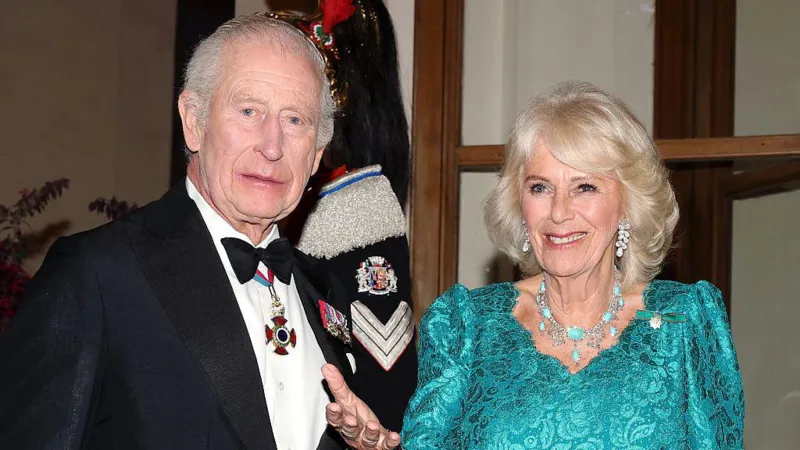
King Charles and Queen Camilla have had a private meeting with Pope Francis at the Vatican where he wished them a happy 20th wedding anniversary.
In a statement released by Buckingham Palace, the King and Queen said they were “delighted the Pope was well enough to host them – and to have had the opportunity to share their best wishes in person”.
The meeting took place on the third day of their state visit to Italy and ahead of a state banquet in Rome on Wednesday evening.
It is understood the meeting was only confirmed on Wednesday morning. It came after previous plans for the couple to meet the pontiff in a state visit to the Vatican were postponed because of the Pope’s ill health.
(BBC)
Foreign News
Belgian prince loses bid for benefits on top of £300k royal allowance
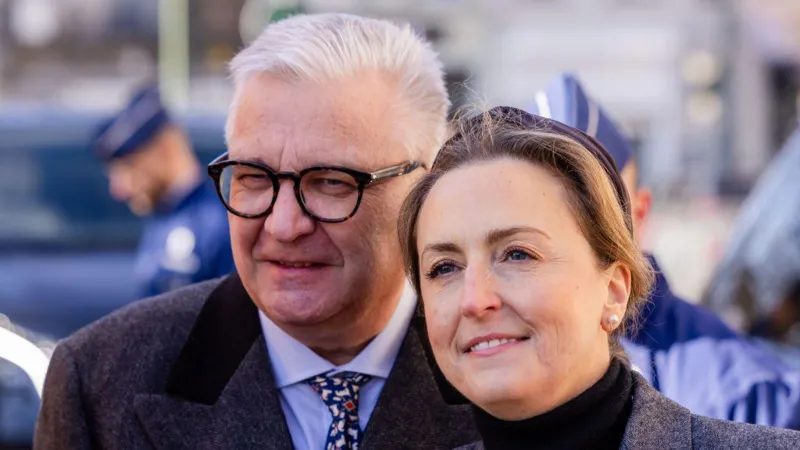
A Belgian prince’s attempt to claim social security benefits on top of his six-figure royal allowance has been rejected by a court.
Prince Laurent – the younger brother of King Philippe – received €388,000 (£295,850; $376,000) from state funds last year but said that his work entitles him and his family to social security.
He had argued that he was partly self-employed because of the duties he carries out as a royal, as well as running an animal welfare charity for the past decade.
Laurent, 61, said he was acting out of “principle” rather than for money. The court disagreed.
“When a migrant comes here, he registers, he has a right to social security,” he told Belgian broadcaster RTBF.
“I may be a migrant too, but one whose family established the state in place.”
But on Monday a court in Brussels turned down Laurent’s request on the grounds that the prince can be considered neither self-employed nor an employee.
However, according to broadcaster VTM the judge acknowledged that the prince should actually be entitled to a pension – but said gaps in legislation made that impossible and called for the law to be amended.
His lawyer, Olivier Rijckaert, told Belgian newspaper Le Soir that Laurent’s request had not been based on a “whim” and insisted on its symbolism, saying that social security is “granted by Belgian law to all residents, from the most deprived to the richest”.
Mr Rijckaert also said that most of the prince’s allowance is spent on his assistant’s salary and various travel expenses.
This means Laurent is left with about €5000 (£4300; $5500) a month but no social security benefits, such as the right to claim back some medical expenses.
The prince – who has three adult children with British-born wife Claire Coombs – has also expressed his concerns over his family’s wellbeing since the royal allowance will be cut when he dies.
Laurent took legal action against the Belgian state after his application for social security was refused. A first hearing was held in November 2024.
According to RTBF, the prince and his legal counsel have not yet decided whether to appeal the court’s decision.
Laurentm who is the 15th in the Belgian line of succession, is no stranger to controversy and is sometimes termed the prince maudit – the “cursed prince” – in Belgium.
In 2018, the Belgian federal parliament voted to dock his monthly allowance for a year after he attended a Chinese embassy reception without government permission, in full naval uniform.
He has also racked up several speeding fines and has been criticised for attending meetings in Libya when the late Muammar Gaddafi was still in power.
[BBC]
-

 Business3 days ago
Business3 days agoColombo Coffee wins coveted management awards
-

 Business5 days ago
Business5 days agoDaraz Sri Lanka ushers in the New Year with 4.4 Avurudu Wasi Pro Max – Sri Lanka’s biggest online Avurudu sale
-

 Features4 days ago
Features4 days agoStarlink in the Global South
-

 Business6 days ago
Business6 days agoStrengthening SDG integration into provincial planning and development process
-

 Business5 days ago
Business5 days agoNew SL Sovereign Bonds win foreign investor confidence
-

 Features1 day ago
Features1 day agoSri Lanka’s Foreign Policy amid Geopolitical Transformations: 1990-2024 – Part III
-

 Features4 days ago
Features4 days agoModi’s Sri Lanka Sojourn
-

 Midweek Review1 day ago
Midweek Review1 day agoInequality is killing the Middle Class











